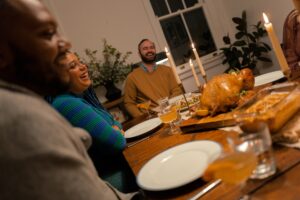Listen to this article
Family is the best of things, and yet it can sometimes be challenging. You love them, but sometimes you hate them and can’t stand to be around them. One person describes family: “Families are like branches on a tree; we grow in different directions, yet our roots remain as one.” (Anonymous)
 Whatever you may feel about your family, whether Thanksgiving, Christmas, and the other holidays are a time you are positively giddy about time together or they are a time you dread and that brings sorrow, they are your family.
Whatever you may feel about your family, whether Thanksgiving, Christmas, and the other holidays are a time you are positively giddy about time together or they are a time you dread and that brings sorrow, they are your family.
It might be that thoughts of family stir up negative emotions for you because of past or present experiences. The Bible speaks honestly and realistically about families, as it does on every other subject, and it also speaks a word of hope for families. One way we can have hope of redeeming the word and concept of ‘family’ is rooted in recognizing that God has created a new family for us to be part of.
Bible Verses about Family
Family drama is common among Americans, as it is across the world. Everyone has a relative or two that the whole family tends to avoid, and sadly you might be that person for one reason or another. Across time, family drama is a constant, and we find many stories in the Bible that remind us of this. Christian Counseling Allen can help navigate these difficult family dynamics with compassionate, faith-based support.
Instead of quoting specific Bible verses, this article will point out the stories that help portray an accurate picture of families. Where possible this will focus on a specific verse that sums up the story.
From the first pages of the Bible, we find Adam and Eve playing the blame game when things go awry. The first human couple disobeys God by eating the fruit of the knowledge of good and evil (Genesis 3).
God asks what happened, and Adam proceeds to deny his role: “The man said, ‘The woman you put here with me – she gave me some fruit from the tree, and I ate it.’” (Genesis 3:12, NIV) Eve blames the serpent, and God says that from then on the relations between husband and wife will be competitive and antagonistic (Genesis 3:16), which is not what God had intended for them.
Soon afterward, we read the story of Cain and his brother Abel, the first story of killing one’s sibling, but certainly not the last. Cain was angry at his brother Abel because God looked with approval on Abel’s sacrifice. Cain decided to kill his brother, and when God spoke to Cain to hold him accountable, he uttered the now infamous words: “Am I my brother’s keeper?” (Genesis 4: 9, NIV)
Elsewhere in Genesis, we read of Jacob and Esau, the twin sons of Isaac, who had a fractious relationship that included Jacob stealing his older brother’s birthright at the urging and with the aid of their mother Rebekah (Genesis 27).
 When Jacob flees his brother’s anger, he stays with his uncle Laban, the brother of his mother Rebekah. Laban tricks Jacob into marrying Leah, his older daughter, and then proceeds to steal Jacob’s flocks and labor (Genesis 30-31).
When Jacob flees his brother’s anger, he stays with his uncle Laban, the brother of his mother Rebekah. Laban tricks Jacob into marrying Leah, his older daughter, and then proceeds to steal Jacob’s flocks and labor (Genesis 30-31).
This is to say nothing about the unhealthy competition that existed between Leah, Jacob’s first wife, and Rachel, who was Leah’s sister and Jacob’s second wife. Jacob favored his son Joseph through Rachel because he had wanted to marry her before Laban tricked him into marrying Leah. In favoring his son Joseph, Jacob seeded animosity between his children, and that’s one reason Joseph’s brothers decided to sell him into slavery.
All this is happening in the first book of the Bible. We haven’t even gotten to other dysfunctional families such as that of King Saul, Israel’s first king, who said and did this to his son Jonathan:
Saul’s anger flared up at Jonathan and he said to him, “You son of a perverse and rebellious woman! Don’t I know that you have sided with the son of Jesse to your own shame and to the shame of the mother who bore you? As long as the son of Jesse lives on this earth, neither you nor your kingdom will be established. Now send someone to bring him to me, for he must die!” “Why should he be put to death? What has he done?” Jonathan asked his father. But Saul hurled his spear at him to kill him. Then Jonathan knew that his father intended to kill David. – 1 Samuel 20:30-33, NIV
Yikes. Saul tried to kill his son because of his love and support for David, of whom Saul was jealous.
David himself had a deeply dysfunctional family:
- He had an affair with another man’s wife and then had the man killed to cover up his sin (2 Samuel 11-12)
- Amnon, David’s son, sexually assaulted his half-sister Tamar, and David did nothing about it (2 Samuel 13)
- Absalom, David’s other son and Tamar’s brother decided to take matters into his own hands and killed his half-brother Amnon (2 Samuel 13)
- Later, Absalom decided to conspire against David his father by leading a coup and starting a civil war (2 Samuel 15-18)
Family dysfunction is nothing new, and in the Bible, we see deep dysfunction that marred relationships permanently.
What a healthy family looks like.
A healthy family is supposed to be a safe space of nurture where every member is cherished, supported, encouraged, and given room to flourish into the man or woman that God intends them to be. A healthy family sticks together. Even when they have arguments, they can constructively resolve conflicts and get reconciled.
The Psalmist says “Behold, how good and pleasant it is when brothers dwell in unity!” (Psalm 133:1, ESV) That applies to our natural family as well as to the family of God’s people with whom we are born anew into.
Sometimes, we gather people along our life journey that become our new family. While we must strive to cultivate healthy relationships with the people we share blood ties with, the Bible reminds us that other relationships can end up being closer and more family-like than our natural-born family.
Jonathan and David
One verse that comes to mind regarding this family we make along the way is from Proverbs, which says, “One who has unreliable friends soon comes to ruin, but there is a friend who sticks closer than a brother.” (Proverbs 18:24, NIV) A good example of this is the story of Jonathan and David, whom we’ve already encountered. These two loved each other like brothers, and they were both cut from the same spiritual cloth, possessing bold faith in God.
Even though he knew that David becoming king meant his chances at succeeding his father Saul on the throne perished, Jonathan was faithful to David. This remained even to the point of earning his father’s ire and nearly being killed by him for that loyalty. In later chapters of David’s life, he honored his friend Jonathan by taking care of his son Mephibosheth (2 Samuel 9).
Naomi and Ruth
Naomi and Ruth. Naomi was an Israelite who moved to Moab with her husband and two sons because of famine in Israel. The men all died in Moab, though Naomi’s sons had married Moabite women. Naomi set out to return home to Israel because the famine was over, but Ruth decided to go with her mother-in-law. Naomi tried to dissuade her daughters-in-law, and while the one decided to turn back to her people, Ruth decided to stick by her.
But Ruth said, “Do not urge me to leave you or to return from following you. For where you go I will go, and where you lodge I will lodge. Your people shall be my people, and your God my God. Where you die I will die, and there will I be buried. May the Lord do so to me and more also if anything but death parts me from you.” And when Naomi saw that she was determined to go with her, she said no more. – Ruth 1:16-18, ESV
These two women, bound by loss, stuck by each other, and when the Lord blessed them both later, the women in Israel said to Naomi of Ruth that she was Naomi’s “daughter-in-law who loves you, who is more to you than seven sons.” (Ruth
 The Bible paints a picture of family where the older generation is meant to faithfully pass what is good onto the younger. Some verses that point this out include the following:
The Bible paints a picture of family where the older generation is meant to faithfully pass what is good onto the younger. Some verses that point this out include the following:
And these words that I command you today shall be on your heart. You shall teach them diligently to your children, and shall talk of them when you sit in your house, and when you walk by the way, and when you lie down, and when you rise. – Deuteronomy 6:6-7, ESV
I will open my mouth in a parable; I will utter dark sayings from of old, things that we have heard and known, that our fathers have told us. We will not hide them from their children, but tell to the coming generation the glorious deeds of the Lord, and his might, and the wonders that he has done. – Psalm 78:2-4, ESV
Listen, my son, to your father’s instruction and do not forsake your mother’s teaching. – Proverbs 1:8, NIV
Listen, my sons, to a father’s instruction; pay attention and gain understanding. I give you sound learning, so do not forsake my teaching. For I too was a son to my father, still tender, and cherished by my mother. – Proverbs 4:1-3, NIV
Children, obey your parents in the Lord, for this is right. “Honor your father and mother” – which is the first commandment with a promise – “so that it may go well with you and that you may enjoy long life on the earth.” Fathers, do not exasperate your children; instead, bring them up in the training and instruction of the Lord. – Ephesians 6:1-4, NIV
Families are thus meant to be spaces of wise and godly nurture marked by love. The Bible also has much to say about husbands and wives and how they ought to relate to each other with respect and love (Ephesians 5:21-33; Colossians 3: 18-21; 1 Peter 3:1-7). However, families aren’t always what they are meant to be.
Family counseling can help a family grow closer together, learn to identify flashpoints and resolve conflicts before they escalate, build better communication and problem-solving skills, and help to resolve any trauma that may be fueling unhealthy behaviors such as discipline issues, substance abuse, or eating disorders.
If your family could use help to become a nurturing environment where everyone flourishes and is respected and loved, reach out to a Christian marriage and family therapist at Christian Counseling Allen to journey with you.
“Breakfast”, Courtesy of Jimmy Dean, Unsplash.com, Unsplash+ License; “Looking Across the Fields”, Courtesy of Luemen Rutkowski, Unsplash.com, CC0 License; “First Scooter Ride”, Courtesy of Rendy Novantino, Unsplash.com, CC0 License; “Turkey Dinner”, Courtesy of Michael Tucker, Unsplash.com, Unsplash+ License
- Kate Motaung: Curator
Kate Motaung is the Senior Writer, Editor, and Content Manager for a multi-state company. She is the author of several books including Letters to Grief, 101 Prayers for Comfort in Difficult Times, and A Place to Land: A Story of Longing and Belonging...
DISCLAIMER: THIS ARTICLE DOES NOT PROVIDE MEDICAL ADVICE
Articles are intended for informational purposes only and do not constitute medical advice; the content is not intended to be a substitute for professional medical advice, diagnosis, or treatment. All opinions expressed by authors and quoted sources are their own and do not necessarily reflect the opinions of the editors, publishers or editorial boards of Stone Oak Christian Counseling. This website does not recommend or endorse any specific tests, physicians, products, procedures, opinions, or other information that may be mentioned on the Site. Reliance on any information provided by this website is solely at your own risk.





